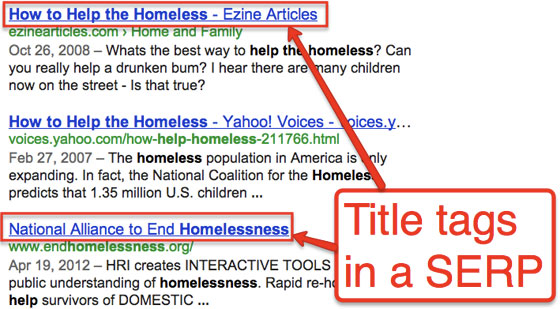
Target audience: Nonprofits, cause organizations, foundations, NGOs, social enterprises, businesses, educators, journalists, general public.
 Atitle tag is the main title of a webpage that search engines index. It’s visible in the title bar of a browser and in the headings of search engine results, as shown below.
Atitle tag is the main title of a webpage that search engines index. It’s visible in the title bar of a browser and in the headings of search engine results, as shown below.
An effective title tag is one that encourages people to click on it, and also contains keywords you’d like to get found for in a search engine results page (SERP).

WordPress makes editing title tags very easy – especially with plugins like All-in-One SEO plugin and themes like Headway.
Generally speaking, the title of the post or page will automatically generate a title tag that can be tweaked further in the post options, as shown below.

Here are five steps to writing better title tags. Regardless of the platform — WordPress, Joomla, etc. — writing title tags friendly to the search engines (SEO, or search engine optimization) essentially follows the following steps:
Decide what keywords you want to rank for
1Develop an understanding of how your core supporters talk about you. How do they search for information about your cause? What words do they consistently use in these searches? What specific burning questions are common among your supporters?
Creating content that answers these queries will help you get found more often by the same type of people who already love what you do.
Research your keywords
2Enter the keywords you’ve settled upon in Google, and notice what Google suggests as you type, as shown below. Write your title with these words – in the same order they appear.

When people use Google Instant and select what Google suggests, your website will show up in those results. You can also do more research with the Google External Keyword Tool.
Put your keywords toward the beginning of the title
3Put the keyword you wish to rank for toward the beginning of your title. You’ll optimize how you’re found via Google Instant, and when you do show up on the first page of Google search results, users will more easily notice your title as they scan down the results.
Keep your titles short
4Keep your title under 60 characters. Most search engines will only recognize up to 60 characters, and truncate the rest, like the example below. You don’t want your title to appear incomplete, and you certainly don’t want your keywords cut off by the search engines!

Don’t be creative
5You’re writing title tags, not a poem or a short story. Trying to write something that’s creative from a literary perspective won’t help you get found in search. Stick with the language your supporters use.
What’s your tip for writing title tags?John Haydon delivers social web strategy solutions for “the quick, the smart, and the slightly manic.” Curious? Then visit the John Haydon blog, follow him on Twitter or leave a comment.
 This work is licensed under a Creative Commons Attribution-NonCommercial 3.0 Unported.
This work is licensed under a Creative Commons Attribution-NonCommercial 3.0 Unported.









The title tag is, without question, the most important aspect of on-page optimization. It is the first thing Google analyzes when trying to gather the most relevant content for a specific search query.
Tip: Don’t start your home page’s title tag with “Welcome to…” If a first-time visitor likes your page enough to bookmark it, you want them to record a title that makes it easy for them to find it again days, weeks or months later. If the user keeps his bookmarks in alpha order, your page’s title will be grouped with all the other “welcome to” entitled links at the bottom of the user’s list.